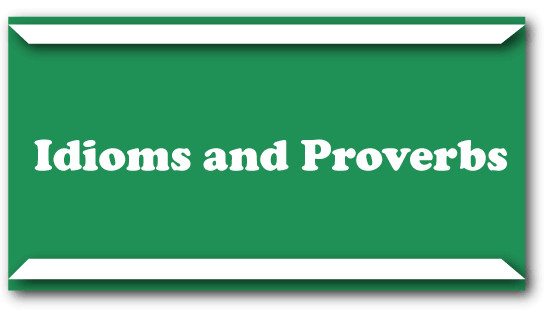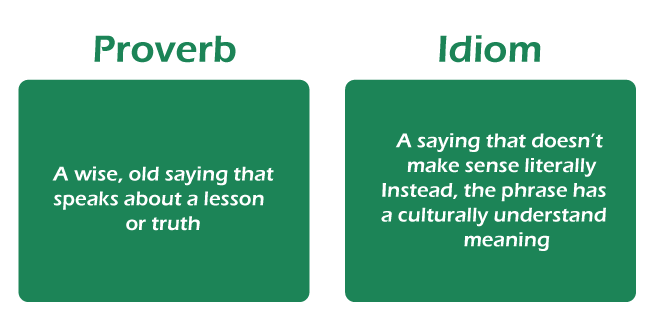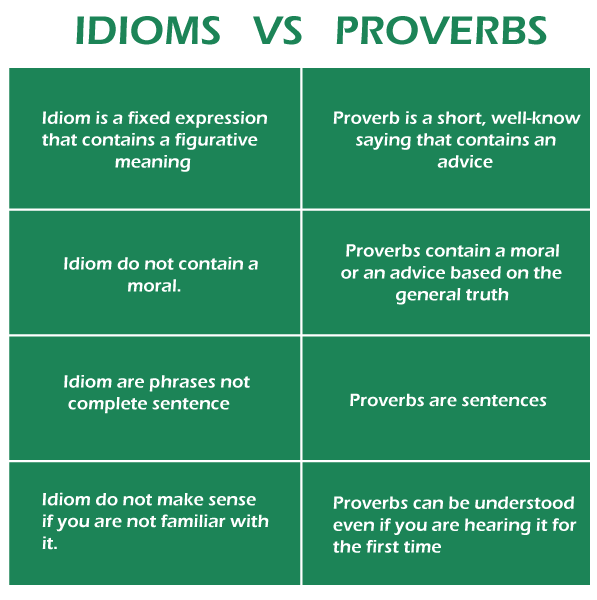Idioms and ProverbsThere are numerous strategies to enhance your English. One is to become more acquainted with idioms and proverbs. If you really want to fully comprehend what native English speakers are speaking, master the most prevalent terms and strive to use them while speaking or writing. 
Every dialect or language has its own set of smart proverbs and idioms. They may provide advice on how to live, as well as convey some of the underlying beliefs, principles, and values of a particular culture or civilization. These are known as idioms and proverbs. Both are used in regular conversation and should be learned. So, what is the distinction between idioms and proverbs? The actual or literal meanings of the words used differ from the meaning of the idioms. For instance, you're employing an idiom when you say, "The cat's out of the bag" rather than "The secret has been revealed." On the other hand, a proverb states that "one apple a day keeps the doctor away." Proverbs are old yet well-known sayings that frequently provide guidance. Idioms and proverbs are both used in everyday conversation. Many are really old and have fascinating backstories. We will have a detailed look at the difference between an idiom and a proverb in the section below. Definition of Idiom and ProverbAn idiom is a statement, saying, or combination of words that come with a metaphorical (instead of literal) meaning that has gained widespread acceptance. The symbolic meaning of an idiom varies greatly from the actual meaning or interpretation of the terms from which it is formed. There are numerous idioms, and they are widely used in all languages. According to estimations, there are at least 25,000 idiomatic idioms in the English language. Idioms are the fundamental building block of a dialect and civilization; they grow the language. They also have a high level of powerfulness, that aids in making a language vibrant and energetic. Idiomatic expressions add a dramatic illustration to daily speech and offer interesting insights into the usage of words, dialects, and the mental processes of its speakers. Moreover, idioms are fun and mysterious ways to spice up writing or conversation. Examples:

ProverbsWe embellish our conversations by using various sayings that add depth to our statements and frequently inject wit and comedy into what we say. Idioms and proverbs are sayings that bring a fresh flavour to your works and enhance your speeches. Proverbs are famous sayings that express a universal truth discovered over decades of experience. They could also symbolize a rational understanding of the world. Most proverbs have a metaphorical connotation. However, they may occasionally provide words of wisdom. A proverb, like an idiom, must be comprehended by going beyond the words that comprise it. So, proverbs can be defined as brief or short sayings meant to transmit knowledge or wisdom. To a certain extent, the true meaning of the terms in a proverb can be used to know/ understand the proverb's hidden message. However, the real or actual meaning of these short statements may be known only by going beyond the literal meaning of the words. Also, Proverbs' tenses cannot be modified. Idioms do not always carry a moral or social message, although proverbs do Examples of Proverbs include;
Proverbs, like idioms, usually have a meaning that is more than the sum of the single words, but in a different way in comparison to idioms. The actual meaning of an idiom usually does not make sense, and idioms can be difficult to grasp unless you have already learned or heard them. Almost every dialect has its own proverb, and certain proverbs can be found in multiple languages. Even if you are hearing a proverb for the very first time, it is not very challenging to know to understand its meaning from the context. However, various individuals can interpret a proverb in diverse ways, especially if it is taken from a different culture. 
What Is the Difference Between Idioms And Proverbs?Idioms and proverbs are distinctive cultural elements of a language. Idioms are set terms used in everyday speech, whereas proverbs are sayings that provide guidance. The fundamental distinction between idioms and proverbs is that proverbs, unlike idioms, include a message or advice. Definition of Idioms and Proverbs
Advice
Meaning of Idioms and Proverbs
Grammatical Structure of Idioms and Proverbs
Understanding of Idioms and Proverbs
There are a few other differences between idioms and proverbs, which include;
Examples of Proverbs and Idioms10 common examples of idioms include;
Common Examples of Proverbs1. It is always better to be safe than sorry. Meaning: you must always take the required steps so that one doesn't regrets it later. 2. All that glitters is not gold. Meaning: Something may not be as valuable as it appears. 3. The grass is always greener on the other side. Meaning: Other individuals always appear to be in a better circumstance, even though this is not always the case. 4. Laughter is the best medicine. Meaning: The best antidote is to try to be joyful. 5. A friend in need is a friend indeed. Meaning: A real friend is one who supports you and assists you while you're in need. 6. Appearances can be deceptive. Meaning: It emphasizes that anything can be extremely different from how it seems or looks to be. 7. Cleanliness is next to Godliness. Meaning: Keeping yourself and your personal space clean is equally as vital as being "good." 8. Honesty is the best policy. Meaning: Even when it is difficult, telling the truth is better than lying. 9. Knowledge is power Meaning: Knowledge is more strong than physical prowess, and no great effort can be accomplished without it. Knowledge is a powerful force that empowers people and aids them in achieving great things. The greater a person's knowledge, the stronger he gets. 10. Two wrongs don't make a right Meaning: if one individual hurts or harms another, the individual who is hurt or harmed must not do anything hurtful in response. Proverbs serve multiple functions in society. The first and arguably most prevalent function of a proverb is to educate. The innate job is to educate people on what might happen if they do something, which is most typically thrown around as expert advice in conversation. Proverbs can inspire someone who is in need of a compassionate and motivating word and assist them in making life decisions. They also strengthen a community's ideals and dialect. ConclusionIt's worth noting that King Solomon created proverbs in 700 B.C. Proverbs and idioms are used to express deep thinking or emotions. Moreover, Idioms and proverbs can be used in various places, including offices, schools, and universities, to motivate individuals and promote a positive environment. There are many types of proverbs and idioms, such as African, English, Chinese, French, etc. A proverb is a piece of wisdom given to individuals, but an idiom is a phrase with its own meaning. An idiom's meaning is unclear to the ordinary individual. Idioms and proverbs both have profound and vivid meanings. Moreover, their differences, examples, meaning and usage have been stated above.
Next TopicNoun Phrases
|
 For Videos Join Our Youtube Channel: Join Now
For Videos Join Our Youtube Channel: Join Now
Feedback
- Send your Feedback to [email protected]
Help Others, Please Share










